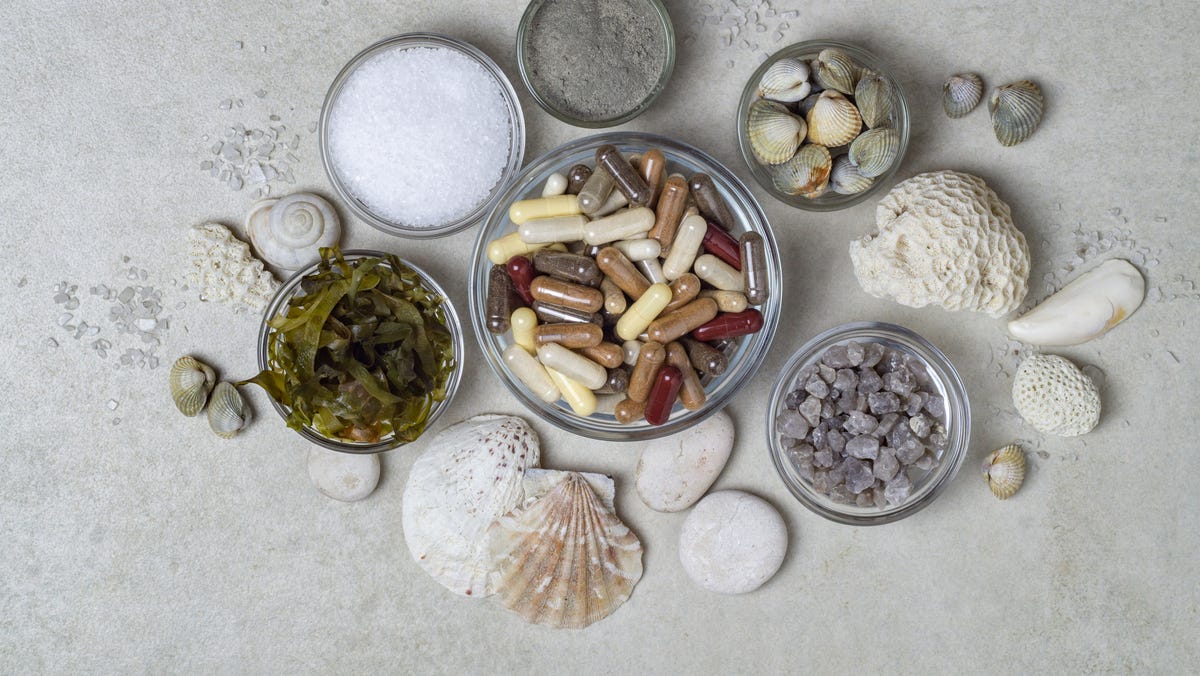
Dietitian reveals which supplements to add to your diet
Registered dietitian Abbey Sharp explains how to best benefit from taking dietary supplements if you’re thinking about adding them to your routine.
The internet has tilted the scales of skincare once again, this time, in favor of an approach that claims to help achieve a glow from the inside out. From influencers touting the benefits of “eating your retinol,” to creators “deinfluencing” you from buying superfluous beauty products, there’s one supplement people can’t stop talking about: sea moss.
So, if you’ve seen scores of influencers taking spoonfuls of sea moss, hyping up the supplements’ potential benefits for radiant skin and better digestion, you might be wondering: Is there research to back the benefits of sea moss, and does the supplement come with any risks?
If sea moss has piqued your interest, here’s what an expert needs you to know first.
What is sea moss?
The active ingredient in most sea moss supplements is Irish sea moss, a reddish seaweed incredibly rich in minerals. It’s particularly high in iodine, and contains other nutrients like calcium, vitamin B2, potassium, magnesium, iron and some zinc, says Maura MacDonald, MS, RD, CSSD, LDN and Medical Education Specialist, Sports Nutrition at Thorne.
Sea moss supplements can be found in a few different forms – from capsules to liquid droplets – but thanks to wellness influencers, one of the most popularized forms of the supplement is sea moss gel. Manufactures often throw in some additional ingredients, like aloe vera, which could enhance the gel-like texture to potentially aid with digestion, says MacDonald.
It’s also common to come across sea moss gel that’s been formulated with vitamin B12, which might benefit someone who is plant-based, and therefore has difficulty getting enough B12 from natural sources alone, she says.
What is sea moss good for?
There’s some research to support that sea moss has prebiotic benefits, which could potentially help aid digestion, says MacDonald. Even if there’s not much fiber in sea moss, the supplement might help “feed good gut bacteria for digestive health,” she says.
There have also been studies that suggest the iodine found in sea moss may support your thyroid function. For those with a pre-existing thyroid condition, it’s best to steer clear of the supplement, says MacDonald.
Is sea moss good for your skin?
When it comes to skin health, the logic behind many of the claims surrounding sea moss’ benefits for skin – from restoring radiance to clearing hormonal acne – is that the “healthier you are on the inside, the healthier you are on the outside,” says MacDonald.
Yes, sea moss does contain a plethora of vitamins and minerals, many of which, on paper, could be very nourishing for your skin – if you have a deficiency in those nutrients, says MacDonald. But Irish sea moss’ benefits for skin aren’t well studied, and there’s limited evidence that directly links the two.
Who should avoid sea moss?
Perhaps the greatest concern surrounding sea moss is the possibility of heavy metal contamination. In its natural form, sea moss is hyper-absorbent. If it’s harvested from an area that’s been polluted, there’s a possibility it could be contaminated with unsafe minerals like mercury or arsenic.
Look for a brand that’s disclosed that the supplement has undergone third-party testing, such as NSF, says MacDonald. “If it’s NSF content-certified, that means (the supplement has) gone through really rigorous testing to make sure there is nothing unsafe,” she says.
Before taking sea moss – or any supplement for that matter – have a conversation with your healthcare provider first. If you have a pre-existing thyroid condition, have been prescribed to follow a low iodine diet, are pregnant and breastfeeding or have an allergy to sea moss or the ingredients added to the supplement, avoid taking sea moss, says MacDonald.
“For a healthy population, (with) no thyroid concerns, it is generally considered safe, so long as the supplement is regulated and third party-tested,” says MacDonald. If you have any concerns about taking sea moss, talk to your doctor, she says.

